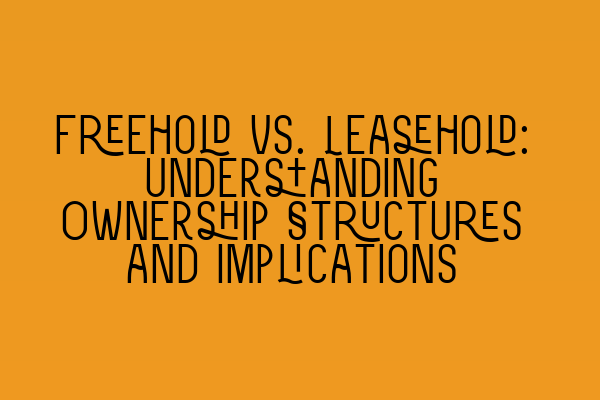Freehold vs. Leasehold: Understanding Ownership Structures and Implications
When it comes to property ownership, two common structures are freehold and leasehold. Whether you’re a prospective buyer or a current property owner, understanding the differences between these two ownership types is crucial. In this blog post, we’ll dive deep into the intricacies of freehold and leasehold ownership, exploring their implications, advantages, and disadvantages.
What is Freehold?
Freehold is the highest form of property ownership. When you own a property freehold, it means you have complete ownership rights and control over both the building and the land it sits on. In other words, you are the outright owner of the property and can do as you please, subject to planning and zoning restrictions.
One of the significant advantages of freehold ownership is that you do not have any time limitations. You can enjoy the property indefinitely and pass it on to future generations. Additionally, as the sole owner, you have the freedom to modify, sell, or rent out the property according to your preferences and financial goals.
What is Leasehold?
Leasehold, on the other hand, grants you ownership of the property for a fixed period. With leasehold ownership, you own the property, but not the land it stands on. The land is typically owned by a separate entity known as the freeholder or the landlord.
In a leasehold arrangement, you enter into a lease agreement with the freeholder, which outlines the rights and responsibilities of both parties. The lease agreement specifies the term of the lease, commonly ranging from 99 years to 999 years. During this period, you have the right to occupy and use the property, subject to certain restrictions outlined in the lease agreement.
Leasehold ownership is prevalent in apartment blocks and flats, where multiple owners share the same building and land. The freeholder is responsible for maintaining the common areas and collecting ground rent and other charges from leaseholders.
Implications of Freehold Ownership
As a freehold property owner, you have several advantages. Firstly, you have complete control and decision-making power over your property. Whether you want to renovate, extend, or sell the property, you have the freedom to do so without seeking permission from anyone else.
Another significant advantage is that there are no ground rent or service charges to pay. You are solely responsible for the maintenance and repair costs of the property, allowing you to budget according to your needs.
However, with great power comes greater responsibility. As a freeholder, you are solely responsible for all the maintenance and repair costs of the property. This can be a significant financial burden, especially in the case of unforeseen repairs or major renovations.
Implications of Leasehold Ownership
Leasehold ownership offers its own set of advantages. Firstly, it provides a more affordable entry point into the property market, as leasehold properties are generally cheaper than freehold properties. This can be particularly beneficial for first-time buyers or those on a limited budget.
Additionally, leasehold properties often come with communal facilities and services, such as gardens, gyms, and parking spaces, which are maintained by the freeholder. These amenities can enhance your quality of life and add value to the property.
However, leasehold ownership also comes with certain disadvantages. One of the main concerns is the potential for escalating ground rents and service charges. These charges can increase over time and significantly impact your budget if not properly accounted for.
Furthermore, leasehold properties may be subject to restrictions imposed by the freeholder, such as limitations on pet ownership, subletting, or alterations to the property. It’s essential to carefully review the terms of the lease agreement to ensure they align with your lifestyle and goals.
Making an Informed Choice
Whether you’re considering buying a property or already own one, understanding the implications of freehold and leasehold ownership is key to making an informed decision. Both ownership structures have their pros and cons, and what works for one individual may not work for another.
If you’re unsure about which ownership structure is right for you, it’s always a prudent choice to seek legal advice from a qualified property solicitor. They can guide you through the legal complexities and help you assess the long-term implications of your decision.
At SQE Property Law & Land Law, our team of experienced solicitors specializes in property law matters. Whether you need assistance with conveyancing, lease negotiations, or property disputes, our dedicated team is here to provide comprehensive and tailored legal solutions.
If you found this article informative, you may be interested in our other related articles:
- SQE 1 Practice Exam Questions
- SQE 1 Practice Mocks FLK1 FLK2
- SQE 2 Preparation Courses
- SQE 1 Preparation Courses
Stay informed and empowered with SQE Property Law & Land Law!
